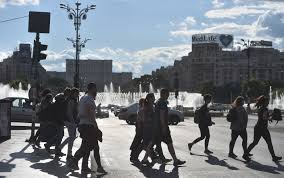Bucharest is a 24-hour city. Its residents are spoiled with shops, parks and bars that open early and stay open well into the night.
You can buy a dress at 10 p.m. and a liter of milk at midnight. As for clubbing and bars, some stay open until the next day and public transport starts running again.
Compare that to Germany, Hungary or even Transylvania where shops close at 6 p.m. with many shutting on Sundays.
But the long opening hours were disrupted by the pandemic. As Covid-19 cases soared, new regulations were recently enforced in the city of 2 million to limit the spread of the virus.
New measures
From Friday to Sunday, all shops and restaurants now have to close by 6 p.m. and there is an 8 p.m. curfew. During the week, shops can stay open to 10 p.m.
More than a week into the new restrictions, Bucharest posted 1,685 cases on Tuesday, the highest single-day figure since March 25. That’s more cases than many countries report in a single day.
Bucharest prefect Alin Stoica on Wednesday appealed to residents to be patient as authorities assess the effectiveness of the new measures.
Anti-mask protests across Romania have been widely reported. But there is muttering and kvetching in the apartments, parks and outdoor terraces of Bucharest about the curtailed consumerism.
Grumblers
The grumblers probably won’t take to the streets to express their annoyance. Early closing hours are an inconvenience rather than a point of principle.
Behold Bucharest last weekend.
At 6 p.m., an hour when many residents would be out buying groceries or hanging out in one of the green spaces, with scarcely a thought about evening outings a few hours later, the streets were deserted.
Bread
You’d think it was wartime, which it is in a way.
The prefect tapped into these curfew frustrations.
“If its 8 p.m and I don’t have bread in the house, I wait until the next morning when the shops open,” he said on Wednesday.
„Early closing and limiting the number of times people leave their home aims to reduce large groups meeting, crowds and frequent contact between people,” he explained.
Supermarkets
„Obviously, if these measures lead to supplementary crowds, they will have to be reconsidered or accompanied by others measures,” he said.
Major stores and supermarkets have been told to abide by a new rule of allowing seven meters between people, but that has been difficult to enforce as it depends on individuals not just the stores.
“We will see how it’s worked out in the next few days,” the prefect said.



















